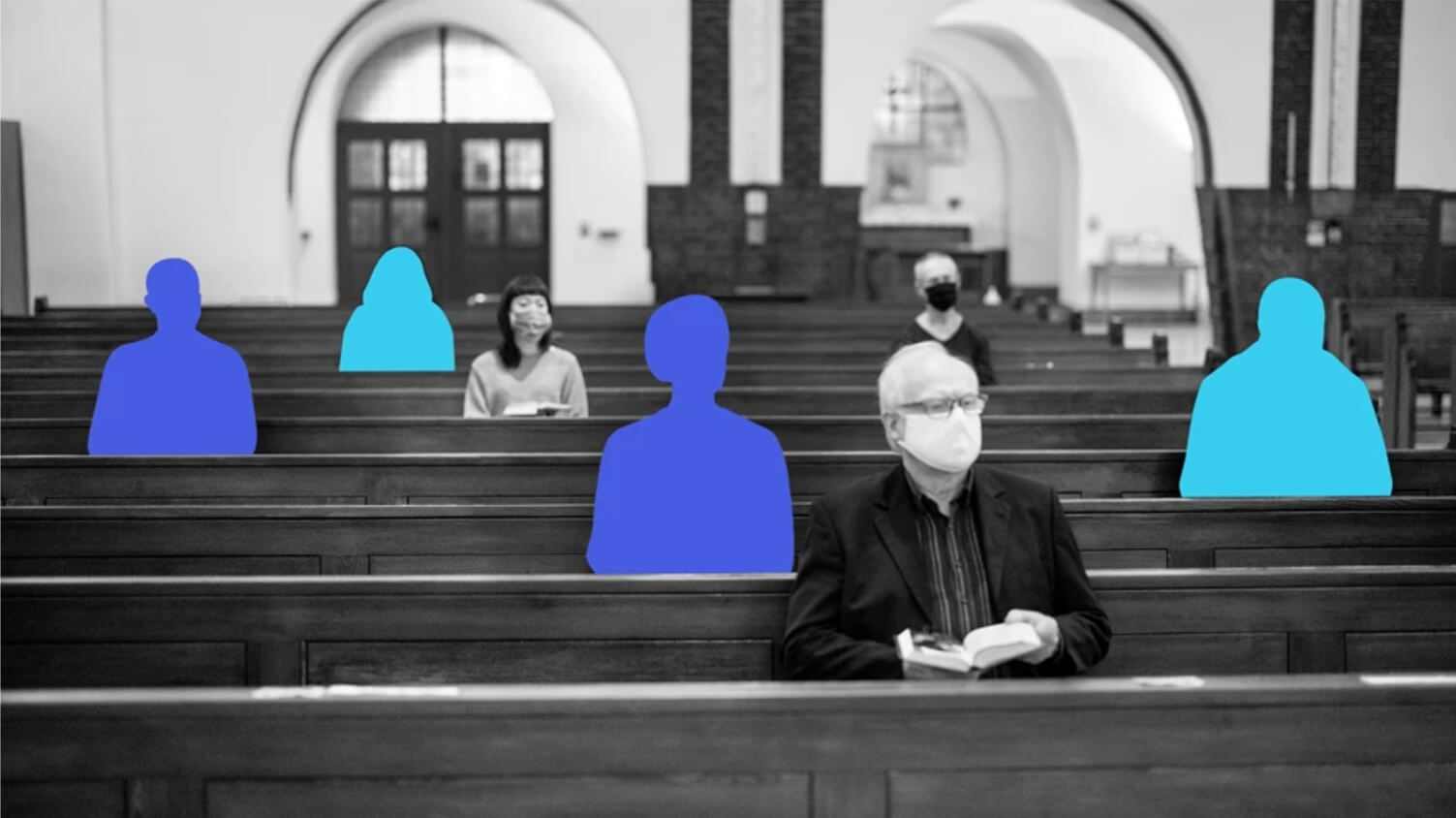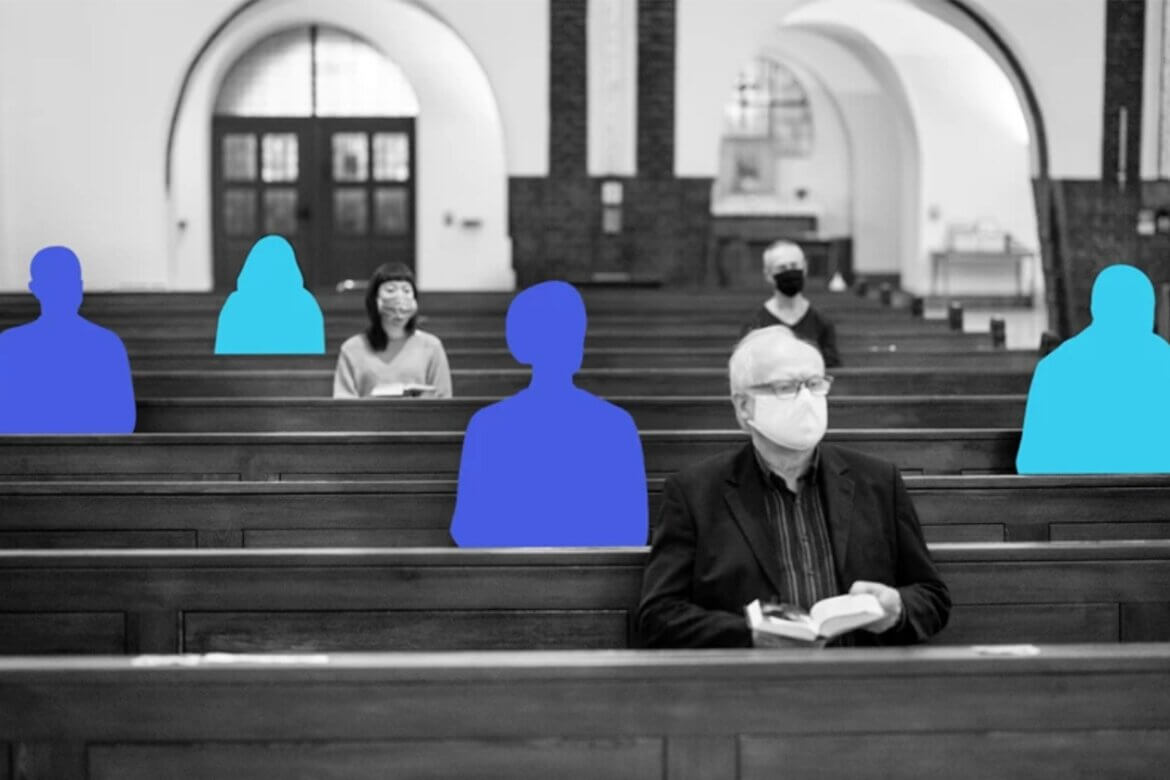The “Institutional Church” is Far From Healthy
Gerald Archibald, Edmonton
Volume 37 Issue 10, 11 & 12 | Posted: January 4, 2023

To no surprise to readers of ICN, Catholics throughout the western world are leaving the Church in droves (See ‘Other News’ articles entitled “Canada Census Shows 2 Million Fewer Catholics” and “People Leaving Church in ‘Droves’ Warns Mary McAleese”). Most parishes are made up of grey-haired older people. Young people and young families are few and far between.
The exception to this trend are new Canadians who share the Catholic faith. However, it is difficult to see how our new Canadians can keep our parishes going. I must say as well, the other mainline Christian churches are also experiencing similar ‘fall-offs’. It seems the major churches experiencing an increase in attendance at those of an evangelical ‘bent’.
I regularly receive feedback from people who read ICN as well as from others who follow attendance trends of their parishes. The forecast is indeed dire. Unless the Church makes deep and significant changes, more and more parishes will continue to close as present church goers become older.
In the past sixty years, there have been a multitude of books and thousands of articles (included within religious periodicals and journals) written by theologians and other gifted scholars who clearly identified this downward spiral. The trend of fewer practicing Catholics has been happening for many years according to Reginald Bibby, a well-known sociologist from the University of Lethbridge. It was even forecasted much earlier in Pierre Berton’s seminal book The Comfortable Pew published in 1965.
There have been many other scholars who have written about this continual downward trend right up to the present time. So the Church has been forewarned many times about what is happening to its attendance numbers.
By stating the obvious here, I’m not talking about the “spiritual” or “divine” side of the Church. I’m only referring to the bureaucratic or institutional side of the Church. Despite being very disillusioned with the way the Church operates, its incredible bureaucracy, its secretiveness, its cover-ups, its history of halting the implementation of the life-giving principles of Vatican II, I do humbly recognize the spiritual.
I believe in the promises of Jesus Christ: “where two or three are gathered in my name, there am I in their midst”, His promise to be with us until the end of time, the beatitudes encouraging us to love one another and to treat others as we want to be treated, and the supremacy of love and that God resides in love and those who love, reside in God.
While I have readily admitted in past columns about my serious issues concerning the institutional church, I must say I greatly admire those Christians, priests, and ministers who are able to keep focussed on these fundamental promises of Christ despite running up against the bureaucracy of the institution, the rules that have emerged over the centuries, and the inflexibility of the liturgy and the music used at Church services, etc.
These are wonderful spirit filled people who continually reach out to others. There are also many current theologians who are tirelessly conveying these messages of love. Among them are Father Richard Rhor and Sister Illia Delio (both Franciscans). As well, these and other messengers of Christ are not afraid to speak out against the injustices of the world. The late Bishop Remi De Roo was indeed one of these modern prophets.
I have nothing but admiration and respect for these exemplary people truly proclaiming the “Good News”. May they keep their “heads down” so they won’t be caught in the crossfires of the Congregation of the Doctrine of Faith in the Vatican, an organization within the Curia (the multi-thousand member bureaucracy in the Vatican that has its roots back hundreds and hundreds of years).
This one organization has silenced many a progressive theologian over the centuries up to and including our present time. How such spirit filled carriers of Christ’s promises can focus on the mystical and spiritual side of the Church is truly exemplary. In addition to these scholars and prophets, I am amazed (and I think somewhat envious) by those Catholics and other Christians who continue attending weekly Church services even if they are aware of the sinfulness of the institutional Church.
I sometimes am concerned that my ‘negative’ views of the institutional Church may be ‘dragging people down’. My intention is only to encourage real change so that the living mystery of Christ can be seen and adopted by others, including myself.
Many have confided in me that they no longer believe in what the Church says. They feel the Church has done so much harm with its cover-ups and intransigence that it no longer has credibility. There was hope for a while regarding the Synodal Path initiated by Pope Francis.
However, word from various dioceses and archdioceses is that the issues brought forward during the “listening” phase of the process, are not adequately represented in the synthesis reports coming out of their jurisdictions. One reader, who follows the Synodal Path closely, came to this conclusion: while the main issues were named in his Diocesan Synthesis Report, there was no passion that serious action must be taken now to address them.
As he put it, there is no sense that the frog swimming in the liquid of this malaise is slowly being cooked to death without its realizing that the temperature was gradually increasing. I’ve heard from two people now who have read the reports coming out of their dioceses. They feel these reports are not really calling for change. Instead, these reports appear to have sanitized the urgent nature of the hundreds of groups who contributed to the diocesan reports.
I know the group my wife and I participated was extremely clear and blunt: unless the Church changes radically and carries the dynamic message of Christ and becomes inclusive, outgoing, carrying Christ’s love to all, and revising its moral code to move away from rules and regulations, we will lose more and more people, especially our young people. As I said in my last column, perhaps the train has already left the station.
Experience
One teacher wrote to me from eastern Canada with this experience: while he was helping to prepare the liturgy and students for a Mass in their school, this student said – “why can’t our liturgy be inspiring, be life-giving, and joyful without it being the “same same” at every Mass. Mass shouldn’t be something that is endured.” Why indeed! – why can’t our liturgy be very flexible so that it catches the attention of everyone present, and invites engagement?
I know another teacher that used a guitar and sang beautiful faith filled songs with folk melodies throughout a student Mass. He was sent a letter by his parish priest that this type of music was not appropriate and that he was forbidden to do this again. He was beyond hurt and made a fateful decision never to darken the doors of the Catholic Church again. He has kept this promise!
I know of young engaged couples who wanted a catholic priest to marry them outdoors, but were turned down due to a policy requiring all marriages be conducted within a catholic church building. Really! Is this what the Catholic Church has become?
A colleague of mine has compared the “operation” of the Church to that of the recent scandal involving Hockey Canada. You may recall that this organization used funds raised for hockey programs to settle sexual abuse cases. In fact, it set up a secretive fund to cover future claims of this nature. After the scandal became public, Hockey Canada claimed it could sort out this mess by itself, without any external involvement or oversight. They were unable to do this. Why? Hockey Canada had become insular and closed, in denial, secretive and non-transparent. It became an ‘echo chamber’ only listening to itself!
Are there not similarities between the actions of this organization and the Catholic Church? My colleague thinks so, and I certainly do. For many years before I retired, I was a management consultant. I was called in to investigate problems within organizations and recommend solutions.
At the risk of overgeneralizing, I must say most of these dysfunctional organizations tended to be insular and closed, in denial, secretive and non-transparent. I have come to believe very strongly, that healthy organizations have completely the opposite characteristics of dysfunctional ones: they were open, desiring to receive honest feedback, refusing to live in denial, and were transparent. In the case of the Catholic Church, clearly there needs to be a complete reworking of its view of ‘authority’ if any of these virtues are to be achieved.
A few years ago, the Catholic Church in Australia found itself in a terrible mess involving the uncovering of decades and decades of sexual abuse scandals. It was so bad that the national government there came to the belief that the Church in Australia could not honestly evaluate itself. They further did not believe the Church could (or would) come up with real solutions that would prevent these terrible scandals from ever happening again (It was closed and insular, in denial, and secretive).
So, the Australian Government said in effect “Fine, we will conduct this national review ourselves!” Can you imagine! A government, feeling that it could not believe that the Church could take credible evaluative action itself. In fact, the Australian government called this major evaluation a Commission. When the results came in, they were stark and damning.
Now the Bishops are dithering what to do with all the recommendations. So while I was hopeful for the Synodal Pathway that would seriously address the issues keeping people away from the Church, I fight becoming discouraged that any substantial change will occur. If real change doesn’t occur because of the Synod, the institutional side of the Church will have won again! However, when I reflect on all of this, I try to remember that good must come from all of this in some way and that God is in charge!
Anyway, this is the way I see it!
(Contact me:
archibaldjerry@gmail.com)
Gerald Archibald, Edmonton

